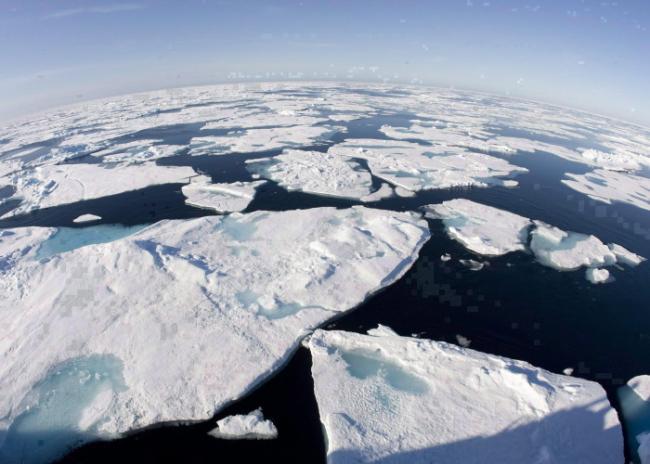Articles Menu

Canada's North is already experiencing significant impacts due to climate change. In Nunavut changes to sea ice cover threatens traditional hunting routes. THE CANADIAN PRESS/Jonathan Hayward
As Canada’s first ministers prepare to meet next month to discuss a national climate plan, a new report from the Yukon shows the toll climate change is taking on the North.
The new Yukon Research Centre study confirmed the territory is warming twice as fast as southern Canada, a finding consistent with other reports that say the Arctic is warming at twice the rate of the rest of the world.
The report found the territory’s annual average temperature has increased by 2 C over the past 50 years, and its winters have warmed by more than 4 C over the same time period.
Drawing on both scientific and traditional indigenous knowledge the report points to numerous climate impacts already experienced in the territory including thawing permafrost, receding glaciers, and melting sea ice. It also found that there’s a greater risk of floods and forest fires, that the tree line is moving further north and to higher elevations, and the habitat, range and diversity of wildlife is changing.
While John Streicker, the report’s author, said the findings aren’t surprising to those who study climate change, it’s the first report of its kind to provide a rigorous and holistic view of what’s happening in the territory.
The impact of climate change on First Nations traditional food security and infrastructure are two major concerns for the territory going forward, he said.
“Many Yukoners, especially First Nations, depend on hunting, fishing, and gathering not only for traditional food and to support the local economy, but also as the basis for cultural and social identity,” the report notes.
And with melting permafrost already taking a visible toll on some Yukon highways, and other infrastructure, Streicker highlighted the importance of considering future climatic changes in any new building.
While the report focused on the Yukon, many of the impacts it describes are felt across Canada’s North – disproportionately considering the three territories emitted less than one per cent of the countries’ greenhouse gas emissions as of 2011 figures.
Impacts visible across the North
In Nunavut important infrastructure is vulnerable to melting permafrost, and changes to sea ice cover have taken a toll on traditional hunting routes, according to the territory’s Environment Minister Johnny Mike.
Mike said it was spring when he set out across the ice by dogsled on his first caribou hunt as a boy. But in the decades since, early ice break ups have threatened spring hunting access.
Climate change has also made it more challenging to reliably predict the weather, Mike said, which can make travel across the land more dangerous.
The Northwest Territories is also feeling the impacts of climate change on infrastructure – everything from houses to ice roads, an important lifeline in the winter for remote communities and mines that use the ice-roadways to restock supplies.
“I grew up on the Mackenzie River and we used to have ice bridges…but we built a (permanent) bridge across the Mackenzie River, so it’s a good thing we did because I was in my hometown of Fort Providence just a couple of weeks ago and the river is pretty well open all the way down,” NWT Premier Bob McLeod said this week.
Climate change has also had an impact on traditional foods in the Northwest Territories. McLeod said some fish species have disappeared from the Mackenzie due to warmer temperatures, and coastal communities have less access to seals, an important source of food, because there’s no ice during the summer months.
“The Beaufort sea used to be open four and a half weeks a year, now they get open water 15 weeks a year,” McLeod said.
The national climate strategy
Addressing the impacts of climate change will require a two-pronged approach, one that addresses both adaptation and greenhouse gas emissions, according to Streicker.
In 2009 the Yukon, NWT, and Nunavut signed a pan-territorial agreement to work together on climate change, emphasizing adaptation, and numerous projects related to climate change have been undertaken since then. But much more remains to be done to lessen the climate burden in the North.
On March 2 and 3 Prime Minister Justin Trudeau will meet premiers, and First Nations, Inuit, and Metis leaders to discuss climate change. As the governments move forward with the development of a national climate plan, McLeod and Mike want to see significant federal assistance for the northern territories in both of those areas included.
Last year, the federal government committed to contributing $2.65 billion to an international fund to help developing countries fight climate change. Well, the NWT’s economy is still developing too, McLeod said.
Funding is needed to repair infrastructure and to develop alternative sources of energy – priorities for both Nunavut and the NWT.
Mike also highlighted the need to include indigenous traditional knowledge in the development of the pan-Canadian climate strategy.
“Canada and the world has much to learn from traditional knowledge and there is much that traditional knowledge can contribute to our approach to climate change, especially adaptation, and it is important to us to see the knowledge applied moving forward,” he said.
In a statement, Environment and Climate Change Minister Catherine McKenna commended the Yukon Government and Yukon College for undertaking the climate research project.
“Understanding the nature of these changes can help Canadians prepare for and adapt to these conditions,” she said.
“The federal government is committed to working with northern communities to make sure northern priorities are addressed as part of this framework.”
Neither Yukon’s premier nor environment minister were available for comment.
With files from James Munson.